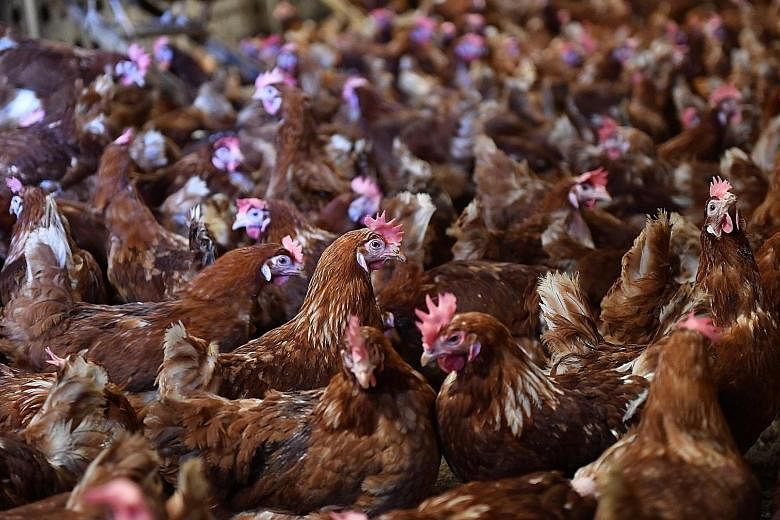MANILA • The Philippines will deploy hundreds of troops to hasten a cull of about 600,000 fowl, the farm minister said yesterday, as part of efforts to rein in the nation's first outbreak of bird flu.
There has been no case of human transmission after the flu was detected on a farm in the province of Pampanga, about 75km north of the capital Manila, but it has spread to about 36 other farms and nearly 40,000 birds have died.
"I have asked the Philippine army to provide us with additional warm bodies to help us in depopulating the farms," Agriculture Secretary Emmanuel Pinol told a news conference.
"Six hundred thousand is no mean job. Our personnel are facing a difficult task and we lack people."
Mr Pinol said the government had about 200 men in the area, but fewer than 20,000 birds had been culled since the outbreak was reported.
Brigadier-General Rodel Mairo Alarcon said at least 300 soldiers would be sent to the province today to assist in the culling of chicken, quail and ducks.
"The Philippine army and the Armed Forces of the Philippines is 100 per cent in support of this effort," Brig-Gen Alarcon said.
-
600k
Birds to be culled.
200
Soldiers in area.
300
More soldiers to be sent in.
36
Farms infected.
40k
Birds dead from virus.
Soldiers will be given protective gear and doses of a drug, Tamiflu, to guard them against possible infection.
Two sick farm workers from the area have tested negative for the virus, health ministry spokesman Eric Tayag said.
Although the health ministry has yet to identify the specific strain of the virus that hit the Philippines, health and farm officials say initial tests have ruled out the highly pathogenic H5N1.
Samples are being sent to Australia for further testing to determine the presence of the N6 variety of the strain.
Mr Pinol said poultry farmers can get reimbursed for their losses if they show the feet of chickens, quails and ducks that have been culled.
He said affected poultry farms would be entitled to 80 pesos (S$2) for each egg-producing chicken and duck as well as each broiler, or bird fattened for meat, that the government was forced to destroy. Farmers would get 10 pesos for each destroyed quail.
Pampanga Vice-Governor Dennis Pineda has formed a team to make an inventory, validate and certify the destroyed birds.
The Philippines is the latest country to report the bird flu virus, which has appeared in Asia, Africa and Europe in recent months. Many strains only infect birds, but the H7N9 strain has led to human cases, including deaths, in China.
REUTERS, PHILIPPINE DAILY INQUIRER/ASIA NEWS NETWORK

